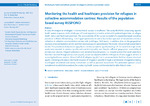Monitoring the health and healthcare provision for refugees in collective accommodation centres: Results of the populationbased survey RESPOND
Biddle, Louise
Hintermeier, Maren
Mohsenpour, Amir
Sand, Matthias
Bozorgmehr, Kayvan
To date, the integration of refugees in German health surveys is insufficient. The survey RESPOND (Improving regional health system responses to the challenges of forced migration) aimed to collect valid epidemiological data on refugee health status and healthcare provision. The core elements of the survey consisted of a population-based sampling procedure in Baden-Württemberg, multilingual questionnaires and a face-to-face approach of recruitment and data collection in collective accommodation centres with multilingual field teams. In addition, data on the geographical locations of accommodation centres and their structural quality were obtained. The results indicate a high overall health burden. The prevalence of depression (44.3%) and anxiety symptoms (43.0%) was high. At the same time, high unmet needs were reported for primary (30.5%) and specialist (30.9%) care. Despite sufficient geographical accessibility of primary care services, frequent ambulatory care sensitive hospitalisations, i.e. hospitalisations that could potentially have been avoided through primary care (25.3%), as well as subjective deficits in the quality of care, suggest barriers to accessing healthcare services. Almost half of all refugees (45.3%) live in accommodation facilities of poor structural quality. Collecting valid data on the health situation of refugees is possible through a combination of targeted sampling, multilingual recruitment and survey instruments as well as personal recruitment. The presented approach could complement established procedures for conducting health surveys and be extended to other federal states.
Files in this item

